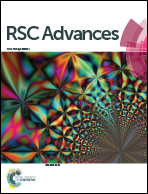Isotope selective activation: a new insight into the catalytic activity of urease
Abstract
Urease, a metalloenzyme, requires carbon dioxide (CO2) for its activation. But, whether this activation is isotope-specific to 12CO2 or 13CO2, is not yet known and even the potential role of CO2 in the enzymatic activity of urease is poorly understood. Here, we provide direct experimental evidence that the catalytic activity of urease exhibits a unique isotope-specific response where the 12CO2 isotope is strongly preferred over the 13CO2 isotope during its catalytic activation. Moreover, this isotope-selective activation depends on different isotopic fractionations (12C:13C) of the reaction-environment as well as the substrate urea (13C-urea and 12C-urea), where the 12CO2 isotope in the reaction medium essentially facilitates the hydrolysis of 13C-enriched urea. This deepens our understanding of the isotope-specific urease activation and its potential role in hydrolytic reaction. Our findings thus may offer novel opportunities for a better fundamental understanding of isotope-specificity in chemical reactions involving metalloenzymes.



 Please wait while we load your content...
Please wait while we load your content...